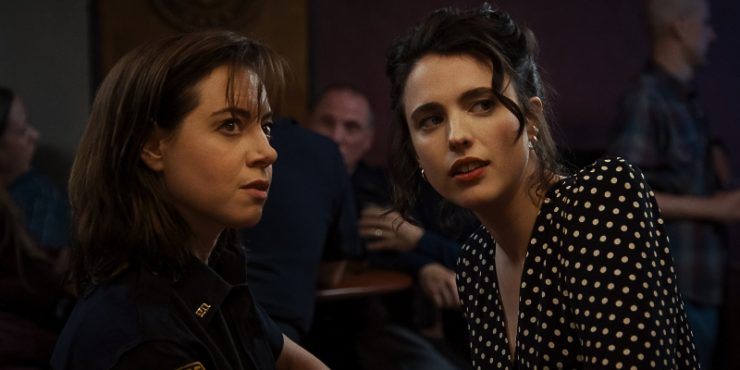The splitting of the Coen Brothers was a minor tragedy among cineastes. The filmmaking duo have made countless masterpieces together, but more so, their filmmaking style has been defined by their symbiosis. It’s often accounted among actors and crew how seamless direction from one leads into direction from the other. Making films separately didn’t seem like a possibility for most of their careers. But after eighteen features, they’ve both gone off to make films themselves. For Joel, it was The Tragedy of Macbeth, a sparse, severe version of the Shakespeare play – if its gravitas was ever in doubt, it starred Denzel Washington in the lead role. For Ethan, it was making films with his wife, Tricia Cooke. Last year’s Drive-Away Dolls was their first major collaboration, Honey Don’t! is the second.
Cooke defines herself as a lesbian, a fact that hasn’t dissuaded her from her marriage from Coen. They’ve claimed that their plan is to make a trilogy of lesbian-themed comedies. Most people didn’t enjoy Drive-Away Dolls. Between its complicated plots filled with red herrings, and Margaret Qualley’s unrestrained Southern accent, it grated on audiences. I found it quite charming. A somewhat coming-of-age tale, there was a zany quaintness to it that felt like Ethan (the younger of the brothers) breaking free of a prestigious reputation that came with making films with Joel. It hits the rocks with Honey Don’t, which takes the lesbian intrigue up a notch while everything else pretty much falls apart. Qualley returns as the titular Honey, a private investigator in rural California who finds herself snooping the strange details of a local girl’s death.
A young woman named Mia is found dead in a car, upside down, far from the road. Seems like a cut and dry car accident fatality, but this same woman called Honey the day before to schedule a consultation. Mia’s immediate death rings Honey’s spidey sense that something may be up. Honey learns that she was a member of a local church, the Four-Way Temple, led by a smarmy reverend, Drew Devlin (Chris Evans). Besides preaching, Drew’s main gig is selling drugs for international suppliers, and running a sex cult with the young women who join the church, including Mia. Mia’s death – and her connection to Four-Way – makes said suppliers nervous. Drew decides he needs to cover his tracks in the most violent way possible, while staying off of Honey’s trail.
As Honey follows the crumbs toward Drew, she also strikes a relationship with officer MG Falcone. They both bond over having fathers who don’t accept their sexuality. Honey also has a moody, teenaged niece named Corinne (Talia Ryder) who has bad taste in boyfriends. Honey’s investigation of Mia’s death, her relationship with MG, and her interest in helping Corinne are the three main narrative threads of the film. None of the three fit comfortably together, and the film’s editing (by Cooke and Emily Denker), struggles to level off the film’s tone. Ostensibly a comedy, sequences of intense (admittedly creative) violence pop up to disrupt any moments of supposed humanity in the characters. I don’t think I’ve ever seen a comedy in a relatively full theater that was laughed at less than Honey Don’t!.
One of Ethan’s talents as a storyteller is his ability to weave moments of seeming unimportance into the story. These flashes of idiosyncrasy which lead to nothing is a major portion of the personality of a Coen Brothers movie. Drive-Away Dolls showed that this was still Ethan’s specialty. But Honey Don’t!‘s red herrings feel perfunctory, and cheapen the viewing experience. You ultimately feel cheated the amount of times you want to invest in a character only to find them violently dispatched with moments later. The tossed off nature feels disdainful, which is ironic. I’m often defending the Coens against accusations of mean-spirited treatment of their characters, but Honey Don’t! is missing something alchemical to the process, and feels like a film too consumed by its preoccupations to make you care about anybody its about.
Qualley is an actress burdened by choice. The bigger the better usually. I think she’s capable of great work (Stars at Noon is a particularly brilliant performance, and I certainly found her work just as indispensable to The Substance as Demi Moore’s), but as Honey she’s all technique and no soul. Evans and Plaza are both chewing scenery in ways that makes you wish they were contextualized in a better movie. Evans especially seems to tap into a tone that Cooke and Coen are striving for, but that character never really gets to do anything significant. For a character that orchestrates a lot of the movie’s bloody violence, he feels almost passive to the events surrounding him. By the time we reach the end of his character, it really does feel like we were being led by the nose all along.
Like Drive-Away Dolls, Cooke and Coen wrote the script together. Unlike Drive-Away Dolls, this film is a total failure. Worse yet, it’s a failure in a completely unspectacular way. This is not a memorable disaster like Megalopolis, which at least had the excuse of vainglorious ego. The screenplay makes the basest political statements about patriarchy and religion in Trump’s America; the tepidness of which makes the anti-Reagan mumblings of Jeffrey “The Dude” Lebowski sound like Karl Marx. The film’s conclusion doesn’t so much tie up its loose ends as it burns them off, hoping you wouldn’t care enough for a fuller explanation. It doesn’t even hit ninety-minutes, which for many is usually a virtue, but in this case feels like evidence that there was a major imbalance between story preparation and story execution. Quite possibly the worst Coen film of all.
.
Directed by Ethan Coen










